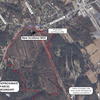Albany school supporters speak out in the ’burbs: ‘End the soft bigotry of low expectation’
VOORHEESVILLE — “We are united for Albany Public Schools,” proclaimed the red T-shirts worn by many in the crowd of 80 facing the Voorheesville School Board on Monday night.
They were there because of comments the board president, Timothy Blow, had made in April as the board listened to a request from parents of a large middle-school class asking for a fifth section next year; the board at the same time was planning to add programs to the high school like Project Lead the Way engineering courses.
“To me, class size doesn’t come before enrichment. This is not Albany City Schools. This is Voorheesville,” Blow had said. “We have good teachers. We have good students. Class size is the cherry on the sundae. Enrichment is the meat and potatoes.”
Blow’s comments were reported in an Enterprise story on the discussion, printed in the April 14 Enterprise. Blow is not seeking re-election.
Monday’s meeting opened with Brian Hunt, Voorheesville’s superintendent, reading a press release. “We understand why the remarks quoted in the paper are upsetting to people, and while they are not a true reflection of what was intended, they have hurt people who are our neighbors and that is something we very much regret,” Hunt read.
Blow, who sat beside Hunt at the board table, facing the crowd, said, “I hope you can accept my apology for my part in this misunderstanding.”
Throughout the discussion that followed, Blow alternately defended his comments and blamed the Enterprise for not reporting them accurately. Several people who were at the April meeting — among them Voorheesville parents Heidi Arnault and Rachel Gilker — said the quotes were correct.
Hunt told The Enterprise after the end of the three-hour meeting that, when he read Blow’s comments in the April 14 Enterprise article, they raised no red flag for him; he said he was not aware they had created a controversy. “I found out this morning,” he said.
Hunt also said he thought Monday night’s discussion was productive and he’d like to work with Albany’s interim superintendent, Kimberly Young Wilkins, “to bridge the gaps” between the nearby districts. “They’re our neighbors,” he said.
Data for 2015 from the State Education Department highlights some differences between the Albany and Voorheesville districts.
As the city speakers pointed out, Albany schools are far more diverse: Half of the students are black, 21 percent are white, 16 percent are Hispanic, 9 percent are Asian, and 4 percent are multi-racial. At Voorheesville, 91 percent are white, 3 percent are Asian, 2 percent are Hispanic, 2 percent are multi-racial, and 1 percent are black.
The much larger Albany district, with 8,391 students, faces more poverty with 57 percent of its students eligible for free lunches. Voorheesville, with 1,168 students, has 7 percent eligible for free lunch. In 2015, fifty-three percent of Albany students graduated, 14 percent with Regents diplomas with advanced designation; at Voorheesville, 96 percent of the class graduated, 45 percent with Regents diplomas with advanced designation.
“We should never be a cautionary tale”
Sue Adler was the first in the crowd to speak on Monday. Vice president of the Albany school board, Adler said she spoke as a parent. She used a phrase echoed many times during the discussion, calling this “a teachable moment.”
Responding to the release Hunt had read, saying that school officials from both Voorheeesville and Albany agreed “there was no malicious intention” behind Blow’s comments, Adler said she’d never thought there was malicious intent. Rather, she likened it to “institutional bias or institutional racism,” which Adler said she had experienced herself as a Jew living in the South.
“We should never be a cautionary tale for others,” she said of Albany schools, and referenced “the soft bigotry of low expectations.”
Adler went on to extol the importance of tolerance, compassion, and understanding what it means to be in someone else’s shoes. “The discourse in this country should be anathema to us,” she said.
Blow responded there was never any intended or unintended bias in what he said; rather, he was “solely speaking of Albany as an urban district,” he said. “We’re a suburban district. We have different priorities putting together a budget.”
Blow also said that he had not read the April 14 article because he doesn’t subscribe to The Altamont Enterprise and also that he was not aware of “the firestorm” on Facebook.
Several Albany students spoke passionately about the value of their schooling and of how they were hurt by Blow’s printed words.
Rylyn Swierzewski, 14, told of how she started as a student in the Albany city schools when she was in third grade after a cancer diagnosis. She’s now in the eighth grade and said she was “always challenged to work at the highest level.”
She also said, “We have good teachers; we have good students.” She told Blow, “Before you make a judgment, make sure you have facts.”
Blow responded that the comments printed in The Enterprise “were not accurate.”
“It hurts students,” Rylyn told The Enterprise afterwards of what Blow had said.
Juliette Pluviose-Philip, a junior in the International Baccalaureate program at Albany High School, stood and told the board how hurtful it is to hear derogatory comments. “It’s particularly hurtful hearing this from an adult, and one involved in education,” she said.
She called the Albany schools enriching and supportive and told Blow, “You said your comments weren’t intentional…These are the kinds of bigotries and stigmas incorporated in people every day.”
She went on, “It’s something we have to not tolerate.” She concluded by urging Blow, “Use your position to foster positive attitudes.”
“I don’t think they were an accurate reflection of what I said,” responded Blow.
“This did not go unnoticed,” said Matt Bergeron, a Voorheesville resident, of the comments Blow had made in April. “Things we say consciously or unconsciously hurt people,” He told the crowd. He noted how some criticize being “politically correct” and suggested, “Whenever you hear P.C., replace it with respect.” He concluded, “Comments like that hurt self-esteem.”
Cathy Martin, retired from the Voorheesville staff, said she supports the teachers and staff. “I know Mr. Blow,” she said. “I’m sure it was off the cuff he said it.”
Martin also said she went through the Albany City Schools and “appreciate what they did for me.” She concluded to applause, “I’m sorry for what happened.”
“Mr. Blow does more for kids off the books than anybody I know,” said Bob Burns. “You people don’t know his heart.”
He also said, “I think someone took something and ran with it and it became newsworthy…Make it a teachable moment and let it end there.”
“You have to be held accountable”
“When you’re a public figure…you have to be held accountable,” said Dr. Christine Pluviose.
She also said, “The children…have to deal with the consequences of what we say and what we teach.” Pluviose said she heard the apology but thought there was room for work.
“These kids,” she said, pointing to the Albany students in the crowd, “are holding on to the burden of what was said.”
Further, she said that Albany High offers a microcosm of the world. “Let’s learn from each other what it means to have cultural diversity.”
Anni-Maxine Quaye, another junior in the International Baccalaureate program, described herself as “a proud Falcon, a proud student athlete.”
She went on, “We don’t get enough recognition for who we are…The stereotypes don’t help us…Pull us up,” she urged. “Don’t bring us down because, in the end, we’re the ones that are going to have to take care of you.”
Hilly Adler, Sue Adler’s son, an Albany High School graduate, currently a student at Harvard, described his Harvard classmates as “sheltered,” contrasting that with the diverse world he learned how to navigate in high school.
“I can see how much they still have to learn…It’s tough for them to understand what life is like for someone else,” said Hilly Adler, concluding, “The first step is not to characterize ‘the other.’ Nothing about ‘urban’ should be different than ‘suburban,’” he told Blow.
Blow responded, “Rather than start a campaign like this…speak to somebody one on one.” He said he had apologized for what he believed were inaccurate statements.
“The comment was made. I heard it,” said a woman from the back of the room. She told the crowd of about 50 from Albany, “You’re kind of saying the same thing — Voorheesville kids are sheltered and don’t know how to handle themselves in the world…I have four children….I do expose them to other things.”
Elex Scheels, also from Voorheesville, said, “There’s a lot of unconscious bias in all of us.” She told Blow, “Instead of saying, I’m sorry it was taken out of context, I think they’re looking for you to take responsibility.”
She said Blow was a volunteer that stands up and gives. “Did he make a mistake? Did he have an unconscious bias? Probably.”
Scheels also said she was part of the PTA in Voorheesville and suggested working with counterparts in Albany. “Let’s rock…Let’s get it together,” she said.
Board unanimous on sixth-grade schedule
At the end of the long meeting, the board returned to the topic that had inspired Blow’s comments in the first place — how to configure next year’s sixth-grade class. Hunt first highlighted new programs for the high school next year. Then Jennifer Drautz, the middle school principal, presented two different ways to schedule sixth-graders next year.
This year, Voorheesville has 102 fifth-graders. Parents had asked to see a schedule that would divide the class into five sections instead of the traditional four in the original budget proposal. A petition in favor of smaller class sizes was signed by over 130 people.
“It’s a trade-off,” said Hunt, noting the schedule with the smaller classes had more study halls and the one with the larger classes had “less down time.” The extra study halls didn’t sit well with Hunt, he said. “We need to engage our kids,” said Hunt.
Hunt also said that teachers were pulled from the high school to make the smaller-class schedule work. “If you pull, we can’t run classes,” said Laura Schmitz, the high school principal.
“Small class size is critical to education,” said Rachel Gilker, a parent lobbying for smaller class size. “A ton of money is going to the high school,” she said, asking school board members how many had children in the middle school. Three hands went up.
“That’s not relevant,” interjected Blow.
“For years, these kids have not had the same experience your children have,” said Gilker, who is running in a four-way race for two seats on the school board.
“What the board has been working at for months and months is to strengthen the program,” said board member C. James Coffin. “We’re in some difficult times…That our people put this together is really damn good.”
He also said, “I got tired of high school kids coming at 10 in the morning and going home at two. We were giving them nothing.”
Coffin said the new programs would help both the college-bound students and those going directly to the workforce. “This is the beginning,” said Coffin. “This is a good deal.”
At the end of a lengthy discussion, all six board members present backed the original plan with four sections for the sixth-graders.
Diana Straut, who is seeking re-election on the board, called it “a very hard decision.” She said, “I’ve heard from people not in this room,” referring to the two sixth-grade teachers and the half-dozen parents advocating for the schedule with the smaller class sizes.
Cynthia Monaghan said she’d heard parents of elementary students say, “I fear what happens in high school.”
Blow read a lengthy statement from Cheryl Dozier, who was absent, lauding the multiple meetings and transparency. “We’ve moved beyond quick fixes…for all learners,” Dozier wrote.
Blow said he felt four sections was a more palatable solution in trying to balance the needs of students in kindergarten through 12th grade.
Michael Canfora, too, supported four sections.
Saia noted that teaching assistants would move up from the elementary school to help with the sixth grade.
She said she was elected to represent everyone in the community. “We have listened,” she said twice. She also said of the superintendent, Hunt, “Brian has looked at every one of your kids’ report cards, looking for trends…Your kids are very much cared for.”
She concluded of school leaders, “They are doing the best they can with what they have.”


